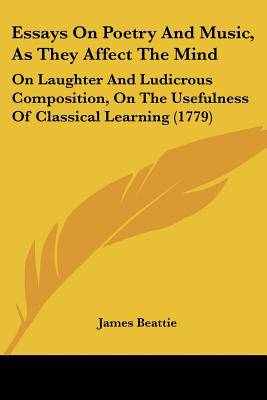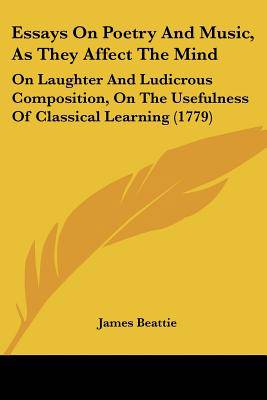
- Afhalen na 1 uur in een winkel met voorraad
- Gratis thuislevering in België vanaf € 30
- Ruim aanbod met 7 miljoen producten
- Afhalen na 1 uur in een winkel met voorraad
- Gratis thuislevering in België vanaf € 30
- Ruim aanbod met 7 miljoen producten
Zoeken
Essays On Poetry And Music, As They Affect The Mind
On Laughter And Ludicrous Composition, On The Usefulness Of Classical Learning (1779)
James Beattie
Paperback | Engels
€ 58,45
+ 116 punten
Uitvoering
Omschrijving
Essays on Poetry and Music, as They Affect the Mind: On Laughter and Ludicrous Composition, on the Usefulness of Classical Learning is a book written by James Beattie and published in 1779. The book is a collection of essays that explore the relationship between poetry, music, and the human mind. In the first essay, Beattie discusses how poetry and music can have a profound effect on the emotions and imagination of the reader or listener. He argues that these art forms have the power to move people in ways that other forms of communication cannot. The second essay focuses on the role of laughter and humor in literature. Beattie explores the different types of humor and how they can be used to create a sense of levity or to make a serious point. The final essay in the book is on the usefulness of classical learning. Beattie argues that studying the classics can help to cultivate the mind and provide a deeper understanding of human nature. He also discusses the importance of preserving classical literature and philosophy for future generations. Overall, Essays on Poetry and Music, as They Affect the Mind is a thought-provoking exploration of the relationship between art and the human experience. Beattie's insights into the power of poetry, music, and classical learning are still relevant today and make this book a valuable read for anyone interested in the humanities.This scarce antiquarian book is a facsimile reprint of the old original and may contain some imperfections such as library marks and notations. Because we believe this work is culturally important, we have made it available as part of our commitment for protecting, preserving, and promoting the world's literature in affordable, high quality, modern editions, that are true to their original work.
Specificaties
Betrokkenen
- Auteur(s):
- Uitgeverij:
Inhoud
- Aantal bladzijden:
- 524
- Taal:
- Engels
Eigenschappen
- Productcode (EAN):
- 9781104744304
- Verschijningsdatum:
- 17/07/2009
- Uitvoering:
- Paperback
- Formaat:
- Trade paperback (VS)
- Afmetingen:
- 152 mm x 229 mm
- Gewicht:
- 693 g

Alleen bij Standaard Boekhandel
+ 116 punten op je klantenkaart van Standaard Boekhandel
Beoordelingen
We publiceren alleen reviews die voldoen aan de voorwaarden voor reviews. Bekijk onze voorwaarden voor reviews.











